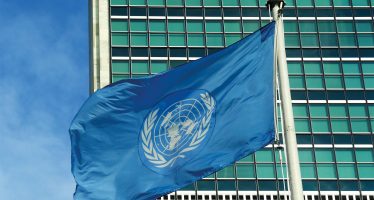IMF Support for Sri Lanka’s Economic Reform Programme

Colombo
An IMF staff mission visited Colombo January 30 – February 13 to discuss possible financial support for Sri Lanka’s economic reform agenda under an Extended Fund Facility. The mission met with government and Central Bank officials, as well as representatives of civil society and the private sector. The mission issued the following statement at the conclusion of its visit:
“Sri Lanka has achieved notable progress on a number of economic fronts over the past few years: growth has been robust, inflation has declined from high double digits, fiscal and external consolidation is underway, and the Standby Arrangement was successfully completed. The economy continues to adjust to the bold policy measures undertaken by the authorities early last year to address emerging imbalances. Credit growth and domestic demand have slowed to a more sustainable pace, the trade deficit has narrowed, and a small balance of payments surplus was achieved last year. At the same time, external demand was undermined by continued weakness in the global economy, and agriculture production was hampered by drought that prevailed for much of 2012. As a consequence, real GDP growth is estimated to have slowed to 6 per cent last year, and inflation rose to upper single digits.
“The economy continues to adjust to the bold policy measures undertaken by the authorities early last year to address emerging imbalances.”
Real GDP growth is projected to increase to around 6¼ per cent in 2013. The recovery will likely be constrained by the need to continue fiscal consolidation; high inflation, which limits the room for near-term monetary easing; and a continued slow recovery in Sri Lanka’s main trading partners, particularly the U.S. and E.U. An excess supply gap is expected to emerge, which should contribute to reducing inflation pressures through the year. The mission agreed with the authorities that lowering inflation to mid-single digits in coming years would bolster macroeconomic stability. This, along with structural reforms to enhance productivity and competitiveness, would support robust growth over the medium term.
The mission welcomed the authorities’ commitment to continued fiscal consolidation, given public debt levels remain elevated. In 2012, the budget deficit was kept close to the target of 6¼ percent of GDP through expenditure restraint and delays in cash payments. The plan to reduce the deficit to 5¾ percent of GDP this year is appropriate. However, tax revenues have now fallen to below 11½ percent of GDP, among the lowest in the region, reflecting slowing activity, falling imports, exemptions and issues with tax administration. In the view of the mission, measures are needed to broaden the revenue base and strengthen administration to support fiscal consolidation, which would otherwise rely too much on reductions in spending, especially capital spending, which would have the potential to undermine medium-run growth. The mission also emphasized that social-sector spending should continue to be protected. The mission discussed the financial performances of the Ceylon Electricity Board and Ceylon Petroleum Corporation, which were adversely affected by last year’s drought, and emphasized the need to move toward cost recovery pricing to place them on a sustainable footing.
The mission and the authorities explored the possibility of a new IMF program designed to build on Sri Lanka’s achievements under the SBA. Productive discussions took place on a number of issues, including further fiscal and related reforms that would consolidate and extend these achievements. The authorities agreed on the broad thrust of reforms, and noted that they already had plans which they would undertake at the appropriate time.
You may have an interest in also reading…
UNCDF and Convergence: Getting the Right Blend in Game-Changing Finance
In December of 2015, the global news website, Quartz, published a piece entitled “Both Venture Capitalists and Banks are Betting
World Bank Report: Digital Payments Vital To Economic Growth
Gates Foundation and Better Than Cash Alliance urge governments to embrace digital financial services, offers concrete action steps. Integrating digital
Institute for New Economic Thinking (INET) and INET Council on the Euro Zone Crisis (ICEC): Europe is Sleepwalking Towards Disaster of Incalculable Proportions
The alternative to fixing the euro is a catastrophic crisis with the euro zone socially unsustainable. The dilemma is how

















































































